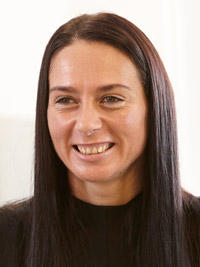Faye Banks, a successful electrical engineer, has risen through the ranks of the engineering community since she ‘discovered’ engineering at the age of 16. Now working in her dream role as North East Electrical Transmission and Asset Manager for National Grid, her working life began very differently, as a line operator in a manufacturing plant. Faye won the Institution of Engineering and Technology’s (the IET’s) Young Woman Engineer of the Year Award in 2004 and has since gone on to become their youngest ever Fellow.

“…I’m very passionate about providing role models for children and teenagers … It’s what I never had in my life and that’s the issue. In that environment you don’t ever see the role models because you’re so far disconnected and if you lack confidence you’re probably never going to achieve your full potential…”
My career story
I started my career through a non-traditional route. I left school at 16 with no formal qualifications and I went to seek advice from a careers advisor at school. My options were very limited. The only advice I got at the time was to join the military, which wasn’t really an option as it wasn’t something I was interested in at the time.
After leaving care at 16 I was given benefits and a council flat, which I was quite embarrassed about. Work was very important to me and within a week I found a job at a local manufacturing plant. The job was basically just packaging plastic containers and after six months I got very bored.
I used to see what the engineers did and how important their role was. We were always pushing to increase productivity. I wasn’t mechanically minded so if the machines broke down I always had to call an engineer.
Where did I want to be in ten years’ time?
I had noticed that the engineers had external training – they were going to college and they were well paid. I was working erratic shifts and long hours on a pretty mundane and boring job. When I looked at where I was going to be in ten years’ time I thought: “There’s no way I can stay doing this. I’m bored now.”
It was never that I wasn’t capable of getting the academic qualifications; it was just all the other external factors which were affecting me at the time, so the instability of living in children’s homes in care, leaving care. It was very erratic, so that was why I never really engaged with the educational system. In care it was just day-to-day survival.
So I had a word with one of the engineers one day when my machine broke down. I asked him what he was doing to repair the fault and we hit it off. He said, “Well if you’re interested you could speak to management and eventually they could sponsor you to go and do an apprenticeship.
Plucking up the courage to ask to be sponsored as an apprentice
So I gathered those thoughts and went home that evening and I decided to go and ask them. They could say “no”, but they could also say “yes”! It could be a life-changing opportunity for me. So the following day after my shift I went to speak to the engineering manager and he told me that they would sponsor me to do an apprenticeship, but first I had to go back to college to get the GCSEs, which was a bit difficult because I’d got Ds and Es when I took my exams at school.
So I went to Wakefield College but they were a little reluctant to take me on because they were afraid that I wouldn’t achieve in maths and the sciences. So I decided I’d write a letter to the principal, who at the time was Heather McDonald.
Going back to college
She received the letter and wrote back the following week. In her letter she said she’d never had a request from anybody to go to college after they’d achieved such low grades at GCSE, and she was quite intrigued as to why I wanted to do it. We arranged to meet and we hit it off straight away. She saw that I was an ambitious person but that I’d had to concentrate on surviving day to day at the expense of my education. Heather agreed to give me the opportunity to go back to college.

Getting switched back on to learning
I always remember back to when I was in junior school and I was eight years old, just before I turned nine – I’d always got the top results in every test in the class – and I remember the teacher saying to me, “You can’t be that intelligent – you’re a Banks.”
The conditions at home were unstable, nobody in my family was academic at all and that comment switched me off from learning, even after I’d been such an enthusiastic learner as a child. At home there were no real role models. Nobody worked – my family were all on benefits.
I used to get very frustrated. I wanted to learn but with my surroundings it was a case of nature versus nurture. I do believe that if the child doesn’t have opportunity to sit down and study to absorb that information, then that can totally go against them. Now I’m a natural learner, but the situation at the time totally switched me off.
One of the maths tutors at college, Peter Gibson, said I had a lot of potential – he could see that I could grasp the concepts. Nobody else in my life had said I was an intelligent person, so when he believed in me it gave me a newfound confidence.
Exam success second time round by learning to learn
I look back now and I don’t know how I did it, but I got ten As. I reflect back now after having gone to university where I learnt how we learn and absorb information – when you are taught you are given information and you absorb it, internalise it and it becomes knowledge. In the past all that internalisation of that information just wasn’t becoming knowledge.

After that year of getting the qualifications I required I went on to do the Higher Engineering Apprenticeship in Electrical Engineering for four years. I got an HNC in Electrical Engineering. After completing my HNC I got a job as an electrical systems engineer and I couldn’t believe it.
Breaking free from instability, insecurity and lack of finance to find my aspiration
I’d never set myself any expectations. I wanted to succeed in life. I knew I never wanted to live how I’d lived as a child. I didn’t want that instability, insecurity, lack of finance – we were always on the breadline. When you’re in those low social circles there’s no aspiration. You don’t even enjoy life.
Coming from that background with a lack of social mobility drove me. Getting the HNC and getting the experience around that was something I never took for granted. I always wanted to push myself when the company gave me opportunities to learn – not just in engineering, but in other things – so for example learning about other areas like finance and other core skills for when I moved into an engineering team leader role at Unilever.
Embracing ‘brave learning’
I continued to develop myself and I was always willing to develop myself. Even with successful engineering peers, not everyone is willing to take learning to the next level, but I’ve embraced ‘brave learning’ – so things that will make me a better manager and a better engineer through learning new concepts and new ways of working. I’ve always tried to be strategic by being the best that I can be, whether that’s in an engineering role or in a management role.
I left Linpac to go to Unilever and spent three years there as an engineering team leader. I really enjoyed my time at Unilever and I learned a lot about business models and environmental management and those kind of aspects, so not just engineering. I learnt about how to run a business which helped me progress to a middle management position.
Being the one female working in a factory of over 500 men
At that time I was the one female working in a factory of over 500 men. To be honest, that was quite tricky, but it became the norm for me. There weren’t women in that environment, so I just accepted that and did the best I could in the situation.
After being at Unilever for three years I moved on to Carlsberg and I got my first middle management position there as manufacturing manager, which was quite a big step up from being a team leader. It was managing the brewery – so all the purchasing, the contracts, production. I was their youngest ever manager at 25. I did that for nearly four years. I decommissioned the site there because Carlsberg wanted to move from large pack kegs to small packs (cans and bottles).
So I decommissioned the plant and moved it all down to Milton Keynes and Northampton. The bottling lines went over to Carlsberg in Copenhagen, so I took redundancy at that point but I was successful in getting a job at Yorkshire Water as Asset Technical Manager. That was a great role for me because I was still heavily involved in engineering and I was a senior manager. I set the asset strategy of the organisation and the policy team worked for me. I set out all the maintenance plans, invested in the new capital infrastructure for Yorkshire Water.
Finding my dream role at National Grid
It was a very challenging role and I was working on multi-million pound schemes with budgets of £26m. It was a massive step up with a totally different style of management, and again lots of learning. I stayed with Yorkshire Water 
When the CEGB (the Central Electricity Generating Board) broke up in 1990 the power stations became generation, the National Grid became the transmission business and the lower voltages were handled by the distribution companies. So in simple terms, National Grid moves the electricity from the power station to the distribution companies who then supply domestic energy users with electricity. In theory we’re the Network Rail of the electricity industry. We move the electricity around the UK.
My work with the IET
It’s been a great journey and National Grid really support me, including with my work with the IET. Out of work I’ve been the secretary for the IET North Yorkshire Network now for four years and I’ve recently become Chair. I’m still involved in STEM activities. I’ve been an NSPCC Ambassador.
I’m very passionate about providing role models for children and teenagers in a similar position to mine. It’s what I never had in my life and that’s the issue. In that environment you don’t ever see the role models because you’re so far disconnected and if you lack confidence you’re probably never going to achieve your full potential.
I achieved Chartered Engineer five years ago and in 2015 I became the youngest ever Fellow of the IET, which was a massive achievement. I initially did a Master’s Degree in Engineering and I went on the do the Masters in Technology Management (which is basically engineering management) and then I did the MBA [Master’s in Business Administration], and at the moment I’m studying for an LL.M for a Master’s Degree in Law.
Developing a thirst for knowledge
So for somebody that was totally written off at school I now love learning and I have such a thirst for knowledge. If I hadn’t got that first job and I hadn’t made those choices I wouldn’t have been anywhere near where I am today.
I know a lot of schools push for university, but looking at my peers who went straight to university, many of them haven’t had the same level of success in industry. We need vocational skills and we’re lacking them in industry, especially for women – it can be a massively successful career for them. I reflect some days and I can’t believe what I’ve achieved. I’ve got all these certificates and letters after my name, but it could have been so different. It makes me so humble.
Getting into the right environment, getting the individual to enjoy learning and getting the support from your company is key. I got a lot of support. It wasn’t until that year at college that it clicked for me and I grasped what the exams were asking for.
It’s taken me 20 years to get to where I am today, but the highlight has been achieving the youngest ever Fellowship of the IET.
Coming up
From a personal point of view I’m focusing on completing my Master of Laws course over the next two years – I wanted to gain a more in depth insight into the legal aspects of engineering. At National Grid I’m planning to stay another couple of years in my current role before looking to develop into a new role. It’s very important to me to keep developing at work.
I used to do marathons before I had my children so I’m training now for the Barcelona Marathon, which I’m aiming to do in 2017. I’m going to have a year running in 2016.
In relation to the IET, I’m involved with their Horizon Bursary Fund, which identifies high potential candidates who 
I’m also involved in the IET National Apprenticeship working group to set out new frameworks for the Trailblazer Apprenticeship. It’s going to be a busy year!
http://www2.nationalgrid.com/uk/
https://twitter.com/nationalgriduk
https://www.facebook.com/nationalgriduk
https://www.linkedin.com/company/national-grid
https://www.youtube.com/user/uknationalgrid





